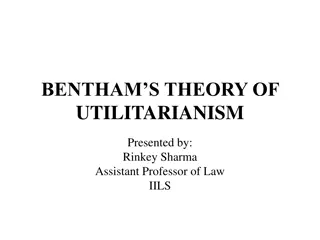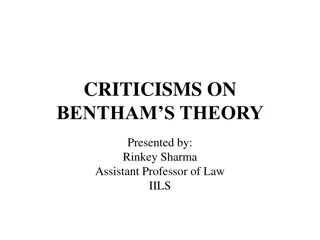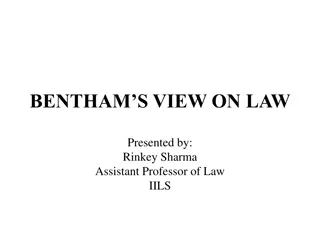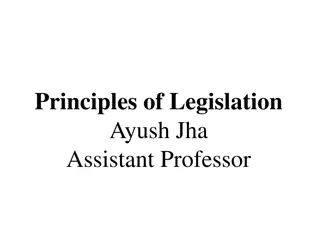Jeremy Bentham and Utilitarianism
Jeremy Bentham, a late 18th-century British philosopher, introduced Utilitarianism, a moral philosophy focused on maximizing happiness and minimizing pain. He believed that all actions are motivated by pleasure and pain, and that the principle of utility judges actions based on their impact on happiness. Bentham's impersonalist hedonism emphasizes the importance of considering the happiness of all individuals. He argued that the principle of utility may not be directly proven but serves as a foundational concept in moral reasoning.
Download Presentation

Please find below an Image/Link to download the presentation.
The content on the website is provided AS IS for your information and personal use only. It may not be sold, licensed, or shared on other websites without obtaining consent from the author. Download presentation by click this link. If you encounter any issues during the download, it is possible that the publisher has removed the file from their server.
E N D
Presentation Transcript
Jeremy Bentham Late 18th- Century British philosopher Roughly contemporary with Kant Interested in application of moral philosophy to social reform
Jeremy Bentham Bentham's hedonism Nature has placed mankind under the governance of two sovereign masters, pain and pleasure.
Jeremy Bentham Bentham's hedonism Nature has placed mankind under the governance of two sovereign masters, pain and pleasure. Descriptive claim: All actions are motivated solely by considerations of pleasure and pain. Normative claim: What we ought to do depends solely on considerations of pleasure and pain
Jeremy Bentham The principle of utility That principle which approves or disapproves of every action whatsoever, according to the tendency which it appears to have to augment or diminish the happiness of the party whose interest is in question.
Jeremy Bentham The principle of utility That principle which approves or disapproves of every action whatsoever, according to the tendency which it appears to have to augment or diminish the happiness of the party whose interest is in question. So: Impersonalist hedonism
Jeremy Bentham The principle of utility That principle which approves or disapproves of every action whatsoever, according to the tendency which it appears to have to augment or diminish the happiness of the party whose interest is in question. So: Impersonalist hedonism So, neither egoistic nor altruistic
Jeremy Bentham Arguing for the principle of utility The principle of utility cannot be directly proven: That which is used to prove every thing else, cannot itself be proved: a chain of proofs must have their commencement somewhere.
Jeremy Bentham Arguing for the principle of utility The principle of utility cannot be directly proven: That which is used to prove every thing else, cannot itself be proved: a chain of proofs must have their commencement somewhere. But considerations can be raised in its favor
Jeremy Bentham Arguing for the principle of utility The principle of utility cannot be directly proven: That which is used to prove every thing else, cannot itself be proved: a chain of proofs must have their commencement somewhere. But considerations can be raised in its favor Arguments for other principles often seem to rely on the principle of utility.
Jeremy Bentham Arguing for the principle of utility The principle of utility cannot be directly proven: That which is used to prove every thing else, cannot itself be proved: a chain of proofs must have their commencement somewhere. But considerations can be raised in its favor Arguments for other principles often seem to rely on the principle of utility. Other ethical theories face considerable problems.
Jeremy Bentham Other ethical theories face considerable problems. Principle of sympathy and antipathy That principle which approves or disapproves of certain actions . . . merely because a man finds himself disposed to approve or disapprove of them.
Jeremy Bentham Other ethical theories face considerable problems. Principle of sympathy and antipathy That principle which approves or disapproves of certain actions . . . merely because a man finds himself disposed to approve or disapprove of them. Objection to the principle What one expects to find in a principle is something that points out some external consideration, as a means of warranting and guiding the internal sentiments of approbation and disapprobation: this expectation is but ill fulfilled by a proposition, which does neither more nor less than hold up each of those sentiments as a ground and standard for itself.
Jeremy Bentham Four sources of pain and pleasure Physical: Arising from the ordinary course of nature, not from any human action. Political: Arising from the actions of some judge. Moral: Arising from chance persons in the community. Religious: Arising from the hand of a superior invisible being.
Jeremy Bentham Measuring Pain and Pleasure Pains and pleasures differ in Duration Intensity Certainty or uncertainty Propinquity or remoteness Fecundity (likelihood of bringing about sensations of the same kind) Purity (likelihood of bringing about sensations of the opposite kind)
Jeremy Bentham So: our actions and our laws must maximize overall pleasure and minimize overall pain.
Jeremy Bentham So: our actions and our laws must maximize overall pleasure and minimize overall pain. Reasons for and against this principle

















































